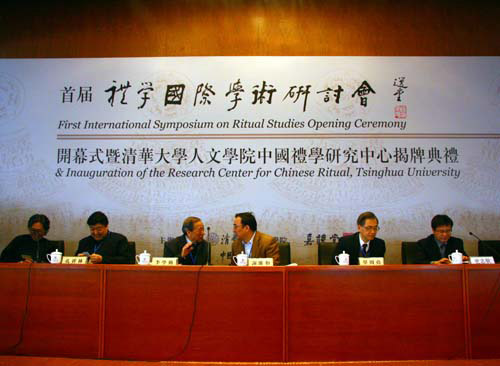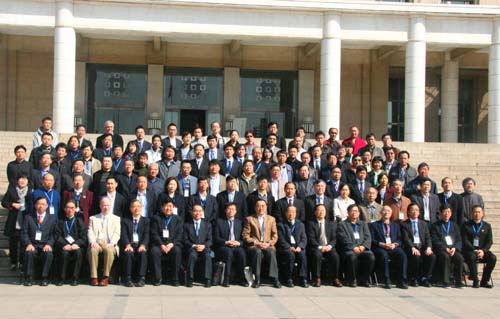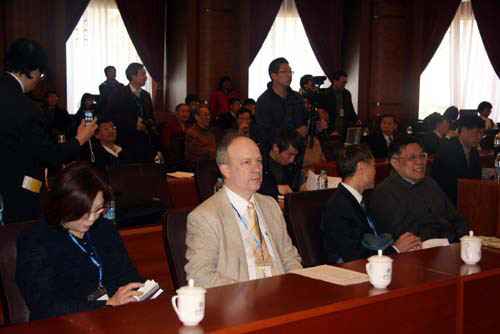
 |
|
The opening ceremony of the First International Symposium on Ritual Studies at Tsinghua University, Apr. 9, 2012. [Photo/China.org.cn] |
 |
|
Group photo of the scholars participating in the First International Symposium on Ritual Studies, Apr. 9, 2012. [Photo/China.org.cn] |
 |
|
Robert Chard, professor of sinology at St. Anne’s College, University of Oxford. [Photo/China.org.cn] |
Traditional Chinese rituals are seen as being synonymous with Confucianism; however they have been marginalized over the course of the last century due to the influx of Western influences in Chinese society.
The ensuing homogeny, which has seen city skylines the world over adopt the same high-rise appearance, and culture and tradition diluted by modern commercial interests, has left many Chinese people struggling to define what makes their culture distinctive.
All of this has led a group of eminent scholars to establish a center dedicated to the preservation and revival of Chinese rituals.
Last Saturday saw the scholars formally set up the Research Center of Chinese Ritual at Tsinghua University, one of Chinese leading universities, known for its rationalism and scientific excellence. The inauguration of the center ushered in three-days of panel discussion forums for the First International Symposium on Ritual Studies.
Commenting on the role of the center, Xie Weihe, the deputy president of Tsinghua University, said: “To revive the Chinese humanities, we need to approach the problem from an orthodox Confucian perspective.”
“We need to figure out the fundamental elements of Chinese culture and identify values which are treasured by all Chinese people.”
Historian Li Xueqing echoed Xie’s sentiment that Confucius and his ideas represent mainstream Chinese culture in society generally.
“History shows us that Confucius was the essence of mainstream Chinese culture, and ritual played a significant role in Confucianism,” Li said.
The influence of Confucian ideas began to wane in the second decade of the 20th century as enlightened young Chinese people began reassess their values in the wake of continuous military defeats in the fight against colonial powers. Young people’s frustrations eventually spilled over on May 4th, 1919 following the signing of the Treaty of Versailles, which ceded Shandong Province to Japan, instead of returning it to China from former colonial power, Germany. Infuriated youngsters destroyed a mantle of Confucius, and the May Fourth Movement was born.
“During the May Fourth Movement, we overturned the traditional Confucian ideas and introduced the concept of Western idealism to the Republic of China (1911-1949). But now, we have to ask the question: What is Chinese idealism?” said Johnson Chang Tsong-zung, curator and co-founder of the Asia Art Archive in Hong Kong, the sponsor of the symposium. He continued: “The collapse of ritual and arts has led to the loss of idealism, and now it is incumbent on everyone to [revive it].”
When referring to the philosophical changes of the last century, Chan Yiu-nam , former Chinese professor at the University of Hong Kong, commented that people are overly affected by an ideological mindset. “Actually, [the values of the rituals we have discussed] have nothing to do with ideologies. Instead, they are about our thinking, about the fundamental rules of the world and about the things related to humanities.”
Despite the sterling efforts of the Chinese scholars seeking to revive traditional rituals, they face an uphill struggle to present China’s traditional culture to the world. Professor Robert Chard, a famous sinologist from the University of Oxford commented that there are rarely discussions about Chinese rituals at international academic symposia. He stated that, often, Western scholars would stereotype Chinese culture in line with the approach they adopt. “So I’m committed to the task of helping people in the West gain a better understanding of China, but it’s a difficult task.”
And it is a task which is made more difficult still by China’s rapidly urbanization and commercialization.
Tony Perrottet, a writer and historian from New York, expressed his sadness at seeing Beijing’s old Hutongs being replaced by artificial constructs. Having spent two weeks touring around the Shanghai and Shanxi, and witnessing the strong commercial atmosphere in Pingyao, a preserved old city in Shanxi Province and Shanghai’s resemblance to Las Vegas, Perrottet commented that it was important to protect the culture’s architecture and arts to preserve the beauty of bygone eras. However, he was not sweeping in his judgment, stating: “People don’t need to take everything from the past.”